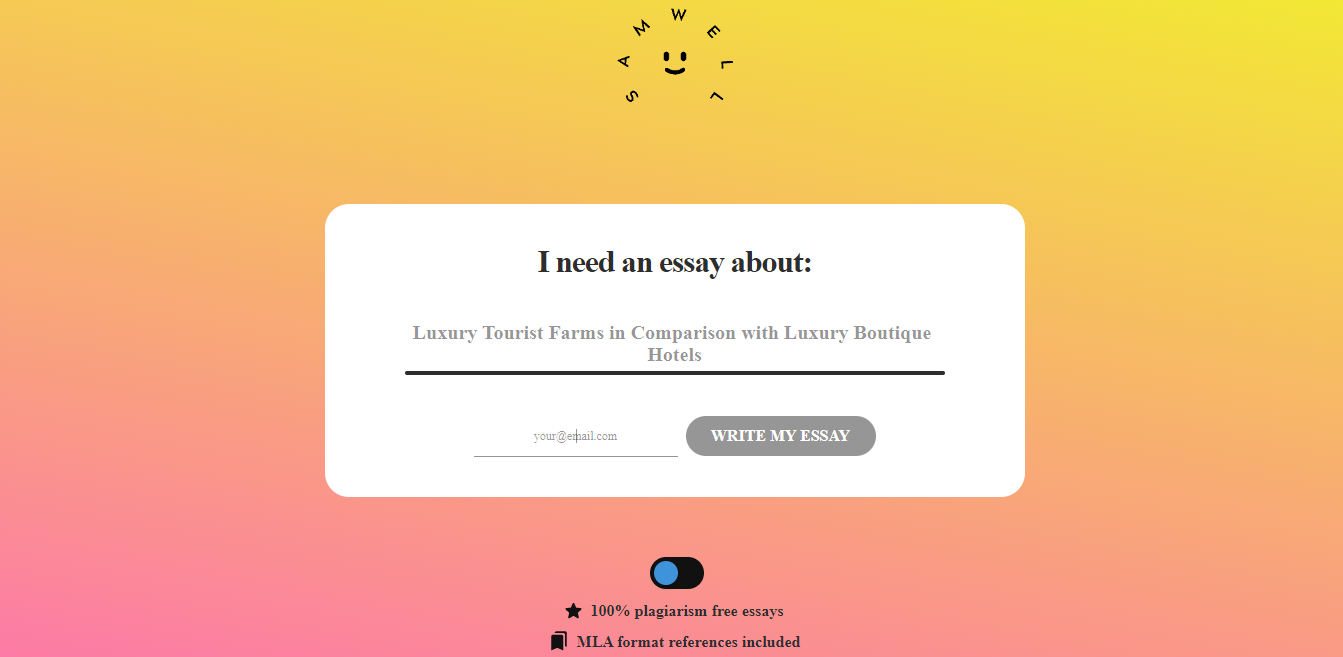Plagiarism Free AI Writer

I am happy to share that I got involved in new AI project for writers and students.
I. Introduction
In this rapidly evolving digital age, the dynamics of writing, knowledge dissemination, and research have
undergone massive changes. Technology, particularly artificial intelligence (AI), has offered significant
opportunities in the field of writing, but also brought forth challenges, especially with the increasing
instances of plagiarism. This essay delves into the concept of plagiarism, the emergence of AI writer
technology, the significance of a plagiarism-free AI writer, and explores the potential remedies to promote the ethical use of AI writer technology while combating plagiarism. In doing so, the essay aims to emphasize the importance of fostering a responsible and plagiarism-free use of AI writer technology,
benefiting writers, students, and the society as a whole.
II. The Problem of Plagiarism
A. Causes of Plagiarism in Writing
Plagiarism refers to the act of using or copying someone else’s work, ideas, or thoughts without due credit or proper attribution. The causes of plagiarism range from inadequate knowledge about proper citation and referencing to intentional cheating or falsification to save time or effort. In some cases, plagiarism may result from the immense pressure to produce original and high-quality work in a competitive environment.
It is essential to understand these causes to address the issue of plagiarism effectively.
B. Consequences of Plagiarism
The consequences of plagiarism can be severe, affecting not only the plagiarist but also the individuals
and institutions involved in their work. Plagiarism can lead to damaged reputations, loss of credibility,
and even legal repercussions in extreme cases. In academic settings, students committing plagiarism may
face disciplinary actions, such as failure in assignments or expulsion from the institution.
C. Increasing Instances of Plagiarism in the Era of Technology
In the modern era of technology, access to information and writing materials has become easier than ever, increasing opportunities for plagiarism. Online sources and information sharing platforms have led some individuals to turn to quick-fix approaches, such as copy-pasting or paraphrasing published works without appropriate acknowledgment. This trend has significant negative implications for the quality, authenticity, and originality of written material.
III. AI Writer Technology
A. Definition of AI Writer Technology
AI writer technology refers to the use of artificial intelligence systems designed to create written
content autonomously. Through machine learning algorithms, natural language processing techniques,
and advanced data analytics, AI writer technology can generate written content that closely mimics human writing in terms of style, grammar, and structure. This technology has a wide range of applications, from generating news articles and academic research papers to crafting marketing content and assisting in creative writing endeavors.
B. Advantages of Using AI Writer Technology
AI writer technology offers numerous benefits, including increased writing efficiency, reduced time spent
on repetitive tasks, and high-quality content generation. AI writer systems can analyze large amounts of
data rapidly, enabling them to provide insights and suggestions to enhance the quality of written work.
The technology can also assist in overcoming writer’s block, offering inspiration and ideas through its
vast knowledge base.
C. Challenges Associated with AI Writer Technology
Despite its advantages, AI writer technology is not without challenges. One major concern is the issue of
plagiarism, as some AI writer systems may inadvertently generate content that is too similar to existing
works, thus infringing on intellectual property rights. Other challenges include reliance on AI technology,
which may stifle creativity or critical thinking skills, and the ethical considerations surrounding the
deployment of AI writer technology.
IV. The Importance of Plagiarism-Free AI Writer
A. The Role of Plagiarism-Free AI Writer in the Fight Against Plagiarism
The development and integration of plagiarism-free AI writer technology can play a crucial role in
combating plagiarism. By ensuring that generated content is both original and in compliance with
intellectual property rights, plagiarism-free AI writer technology can promote responsible and ethical
writing practices while preserving the integrity of the writing process.
B. The Importance of Ethical AI Writer Technology
Ethical AI writer technology, such as plagiarism-free solutions, ensures that AI-generated content maintains high standards of quality, however, it also adheres to the ethical principles and guidelines required in academic or professional writing. This, in turn, can encourage a culture of originality, innovation, and honest collaboration in the research and literary communities.
C. How Plagiarism-Free AI Writer Technology Can Benefit Society
A plagiarism-free AI writer technology can benefit society in several ways, including fostering ethical
writing practices, enhancing the quality of written content, and supporting the development of innovative
ideas. By discouraging plagiarism and promoting a responsible approach to writing, plagiarism-free AI
writer technology can contribute to the growth of a knowledge-based economy and uphold the core values of research and creativity.
V. Possible Remedies to Plagiarism-Free AI Writer Technology
A. Promoting Ethical Use of AI Writer Technology
To promote the ethical use of AI writer technology, it is imperative to implement policies and guidelines
that encourage responsible practices. Stakeholders, including educators, researchers, and policy-makers,
should work collaboratively to develop frameworks that outline acceptable uses for AI writer technology
while explicitly addressing plagiarism concerns.
B. Developing AI Writer Technology with Plagiarism-Free Features
Advancements in AI technology should focus on developing plagiarism-free AI writer solutions. This
includes building systems that can check the originality of generated content, ensuring that proper
attribution and citation standards are maintained, and embedding safeguards that prevent the replication
or close paraphrasing of existing works.
C. Educating the Public about Plagiarism-Free AI Writer Technology
Raising awareness and educating the public about plagiarism-free AI writer technology is vital for combating plagiarism at its source. This can be achieved through school and university curricula, workshops, and online resources that highlight the importance of originality, proper attribution, and responsible use of AI writer technology.
VI. Conclusion
A. Recap of the Significance of Plagiarism-free AI Writer Technology
In summary, the issue of plagiarism in writing remains a major concern in the age of technology. However, the emergence of plagiarism-free AI writer technology offers a promising solution for promoting responsible writing practices and preserving intellectual property rights. By advancing AI writer technology with an emphasis on ethical guidelines, society can benefit from the numerous advantages that AI writer systems have to offer while mitigating the risks associated with plagiarism.
B. Call to Action for Stakeholders and Policy-Makers
The successful implementation of a plagiarism-free AI writer relies on the collaboration and concerted
effort of stakeholders and policymakers. By developing policies and strategies that promote responsible
AI writer technology usage, fostering ethical AI writer development, and educating the public about
plagiarism-free AI writer solutions, society can make significant strides towards combating plagiarism.
C. Final Thoughts on the Future of Plagiarism-Free AI Writer Technology
The future of plagiarism-free AI writer technology remains optimistic, as it not only offers a solution
to a growing problem but also creates opportunities for innovation, collaboration, and creativity. As
technology advances, the responsibility lies on stakeholders, researchers, and policymakers to continue
refining and promoting ethical AI writer systems. By doing so, society can embrace the exciting potential
of AI writer technology while safeguarding the core principles of originality, intellectual property and responsible writing practices.
Please check here to test more: https://samwell.ai



